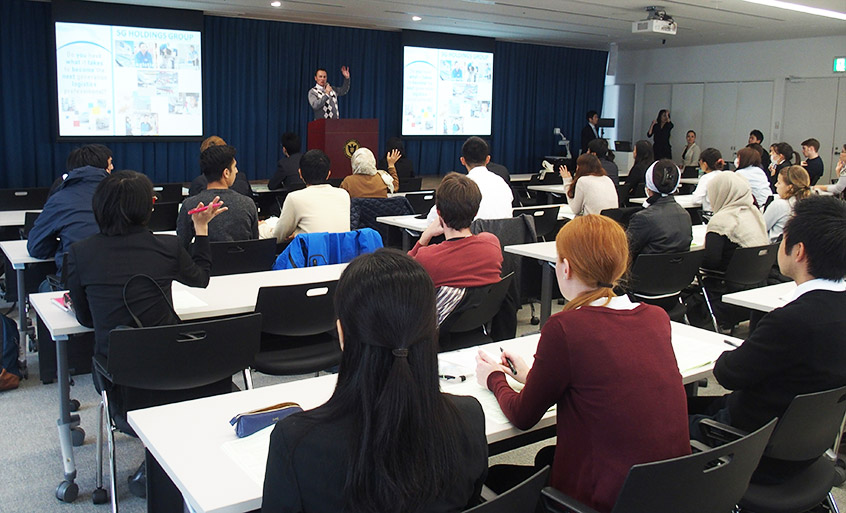Students from about 60 countries are studying at Temple University, Japan Campus (TUJ). More than 60% of TUJ’s student body are foreign nationals. A substantial percentage of this group consists of students from the United States (45%) and Europe. The number of foreign students who want to get jobs in Japan after graduating is increasing every year, but the high level of the Japanese language required by companies keeps many from doing so. The Japanese government hopes to increase the domestic employment rate of graduating foreign students from the current 30% to about 50% by 2020, according to the “Japan Revitalization Strategy” announced last year. This means that promoting the acceptance of highly skilled foreign personnel is an urgent issue in Japan. Addressing these issues, TUJ is promoting three career support measures, mainly through the Career Development Office.
(1) Sophia University – Temple University Japan joint career fair held entirely in English, including recruiters’ presentations and information sessions at booths
In this joint career fair — one of the very few of this kind in Japan — all corporate briefings and question & answer sessions are conducted in English only. The fair has been held jointly with Sophia University since 2012, and over a dozen companies have booths at each fair. “Every year, the fair has become more successful as a meeting place where students and companies can communicate in English, “ said Ms. Nanako Nakamura of Sophia’s Career Center. Sophia University also has many foreign students enrolled. “I would like to continue developing the fair collaboratively to support students who wish to work internationally,” she said.
(2) Developing Japanese job interview skills – a new program at TUJ
The “Japanese Boot Camp” program is being developed by the TUJ Career Development Office and the undergraduate Japanese Language program. It is designed to train foreign students in Japanese job interview skills — critical for job hunting. In order to acquire the skills to pass job interviews, students will take on a 3-week intensive course (beginning on May 8). Japanese Major Advisor and Assistant Professor Ryoko Osada says, “Students will master Japanese expressions specific to interviews, including how to use honorific language, and will focus on the ‘statement of purpose’ and ‘self-promotion.’ Our aim is to increase the number of foreign students who can get through a 30-minute interview in Japanese and win job offers.” Scholarships are offered for participating students.
(3) Long-term credit-bearing internships to gain work experience in Japan
TUJ regards the internship program as a key element in its career education, which has been in place since the university launch in 1982. At present, an average of more than 60 students acquire on-site work experience each semester at more than 60 companies and organizations, including private companies as well as government organizations such as embassies, educational organizations, and non-profit organizations. Most notable is that, under the guidance of a TUJ professor, students can earn university credits if they work more than 140 hours in a semester (about four months). Internship experience is a graduation requirement for some majors, and a majority of TUJ students participate in the program at least once by the time they graduate. “The true worth of our university’s career support lies in providing various programs such as long-term internships that meet the diverse needs of international students,” said Career Development Office Manager Kentaro Sawa.

